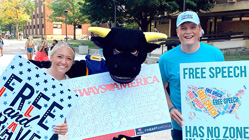State Dept. Pauses Visa Interviews to Prepare for Student Social Media Vetting

The US Department of State is indefinitely ceasing the interview process for student visas in order to determine if social media vetting is deemed necessary for international students in the future.
In a cable obtained by Politico on Tuesday, US Secretary of State Marco Rubio announced:
“Effective immediately, in preparation for an expansion of required social media screening and vetting, consular sections should not add any additional student or exchange visitor (F, M, and J) visa appointment capacity until further guidance is issued…”
In a separate statement published Wednesday, Secretary Rubio made a statement further elaborating on visa restrictions, arguing it will be beneficial to national sovereignty and constitutional rights:
“Today, I am announcing a new visa restriction policy that will apply to foreign nationals who are responsible for censorship of protected expression in the United States,” Rubio wrote. “It is unacceptable for foreign officials to issue or threaten arrest warrants on U.S. citizens or U.S. residents for social media posts on American platforms while physically present on U.S. soil.”
Rubio targeted foreign governments for demanding US tech platforms engage in censorship:
“It is similarly unacceptable for foreign officials to demand that American tech platforms adopt global content moderation policies or engage in censorship activity that reaches beyond their authority and into the United States. We will not tolerate encroachments upon American sovereignty, especially when such encroachments undermine the exercise of our fundamental right to free speech.”
The Chinese government is against the current US cessation of student visas, noting how many of its student population are a part of American universities. According to Newsweek, a Foreign Ministry spokesperson said China “upholds that normal education cooperation and academic exchanges should not be disrupted.”
“We urge the U.S. to effectively safeguard the legitimate rights and interests of all international students, including Chinese students overseas.” 277,398 students from China were enrolled in US universities last year, Newsweek reported.
The exact social media content being vetted by the Department of State, and flagged, is unknown.
The Trump Administration has made it a priority to curb disruptive protests at universities. Several recent protests have involved international students. The pro-Palestine encampments at Columbia University in 2024, which were led by Mahmoud Khalil, an Algerian citizen with US residency, caught national attention amid the ongoing Israel-Hamas conflict. In March, Khalil was detained by US Immigration and Customs Enforcement after his visa was revoked.



















